Related Research Articles

The Long Parliament was an English Parliament which lasted from 1640 until 1660. It followed the fiasco of the Short Parliament, which had convened for only three weeks during the spring of 1640 after an 11-year parliamentary absence. In September 1640, King Charles I issued writs summoning a parliament to convene on 3 November 1640. He intended it to pass financial bills, a step made necessary by the costs of the Bishops' Wars in Scotland. The Long Parliament received its name from the fact that, by Act of Parliament, it stipulated it could be dissolved only with agreement of the members; and those members did not agree to its dissolution until 16 March 1660, after the English Civil War and near the close of the Interregnum.

Henry Rich, 1st Earl of Holland, was an English courtier and politician executed by Parliament after being captured fighting for the Royalists during the Second English Civil War. Younger brother of Robert Rich, 2nd Earl of Warwick, a Puritan activist and commander of the Parliamentarian navy during the Wars of the Three Kingdoms, Henry was better known as an "extravagant, decorative, quarrelsome and highly successful courtier".
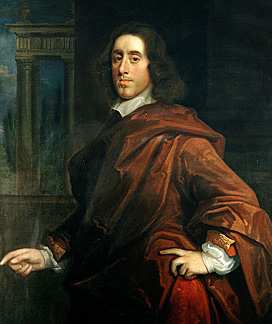
Sir Henry Vane, often referred to as Harry Vane and Henry Vane the Younger to distinguish him from his father, Henry Vane the Elder, was an English politician, statesman, and colonial governor. He was briefly present in North America, serving one term as the governor of the Massachusetts Bay Colony, and supported the creation of Roger Williams' Rhode Island Colony and Harvard College. A proponent of religious tolerance, as governor, he defended Anne Hutchinson and her right to teach religious topics in her home which put him in direct conflict with the Puritan leaders in the Massachusetts Colony. He returned to England after losing re-election and eventually, Hutchinson was banned from the colony.

Denzil Holles, 1st Baron Holles, was an English statesman, best remembered as one of the Five Members whose attempted arrest by Charles I in January 1642 sparked the First English Civil War.
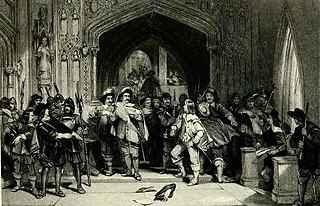
Pride's Purge is the name commonly given to an event that took place on 6 December 1648, when soldiers prevented members of Parliament considered hostile to the New Model Army from entering the House of Commons of England.
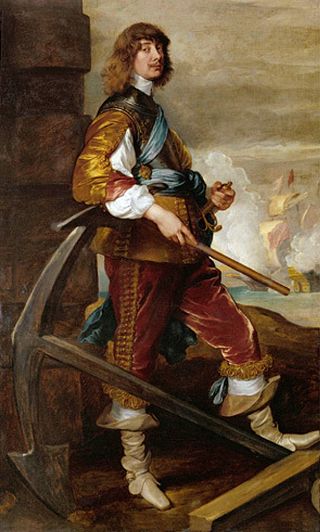
Algernon Percy, 10th Earl of Northumberland, 4th Baron Percy, KG, JP was an English aristocrat, and supporter of the Parliamentary cause in the First English Civil War.
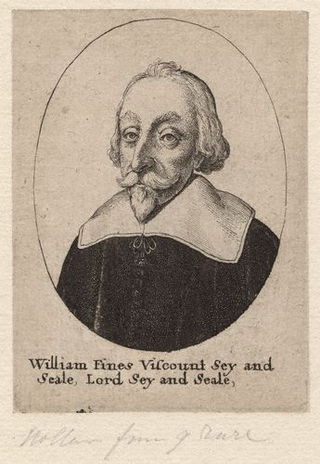
William Fiennes, 1st Viscount Saye and Sele was an English nobleman and politician. He was a leading critic of Charles I's rule during the 1620s and 1630s. He was known also for his involvement in several companies for setting up overseas colonies.

The First English Civil War took place in England and Wales from 1642 to 1646. It is part of the 1639 to 1653 Wars of the Three Kingdoms, which also include the Bishops' Wars, the Irish Confederate Wars, the Second English Civil War, the Anglo-Scottish war (1650–1652) and the Cromwellian conquest of Ireland. Historians calculate some 15% to 20% of all adult males in England and Wales served in the military between 1639 and 1653, while around 4% of the total population died from war-related cause, versus 2.23% in World War I. These figures illustrate the impact of the conflict on society in general, and the bitterness it engendered.
The Committee of Safety, established by the Parliamentarians in July 1642, was the first of a number of successive committees set up to oversee the English Civil War against King Charles I, and the Interregnum.
In Welsh and English church history, Independents advocated local congregational control of religious and church matters, without any wider geographical hierarchy, either ecclesiastical or political. They were particularly prominent during the Wars of the Three Kingdoms as well under the Commonwealth and Protectorate. The New Model Army became the champion of Independent religious views and its members helped carry out Pride's Purge in December 1648.
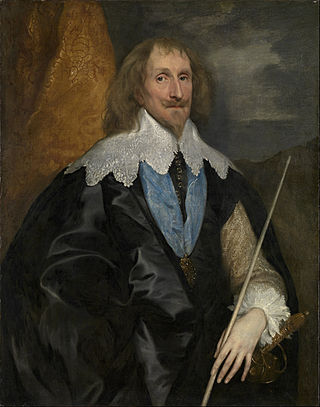
Philip Herbert, 4th Earl of Pembroke and 1st Earl of Montgomery, was an English courtier, nobleman, and politician active during the reigns of James I and Charles I. He married Susan de Vere, the youngest daughter of Edward de Vere, 17th Earl of Oxford, the Oxfordians' William Shakespeare. Philip and his older brother William were the 'incomparable pair of brethren' to whom the First Folio of Shakespeare's collected works was dedicated in 1623.
The Committee of Both Kingdoms,, was a committee set up during the Wars of the Three Kingdoms by the Parliamentarian faction in association with representatives from the Scottish Covenanters, after they made an alliance in late 1643.
Events from the year 1662 in England.
Events from the year 1647 in England.
Events from the year 1648 in England. The Second English Civil War begins.
Events from the year 1680 in England.
The Treaty of Uxbridge was a significant but abortive negotiation in early 1645 to try to end the First English Civil War.
Thomas Wenman, 2nd Viscount Wenman, was an English landowner and politician who sat in the House of Commons at various times between 1621 and 1660.
Samuel Browne, of Arlesey, Bedfordshire, was Member of Parliament during the English Civil War and the First Commonwealth who supported the Parliamentary cause. However he refused to support the trial and execution of Charles I and, along with five of his colleagues, resigned his seat on the bench. At the Restoration of 1660 this was noted and he was made a judge of the Common Pleas.
The Eleven Members refers to members of the House of Commons of England, who were identified by commanders of the New Model Army as their principal opponents. They were suspended and forced into exile for six months; after the 1648 Second English Civil War, many were permanently removed in December 1648.
References
- ↑ "The Treaty of Newport, 1648". BCW Project. Retrieved 21 June 2014.
- ↑ "The Old Grammar School, St James' Street, Newport, Isle of Wight". English Heritage. Retrieved 21 June 2014.
- ↑ The Cambridge Modern History, Volume 1. CUP Archive. 1964. p. 352. Retrieved 21 June 2014.
- ↑ Charles Pastoor, Galen K. Johnson (2009). The A to Z of the Puritans. Scarecrow Press. p. 323. ISBN 978-0810870390 . Retrieved 21 June 2014.